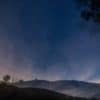My first Tu B’Shvat seder was with Bonna and Shmuel Haberman Browns, in London, in 1986. Bonna z”l was an amazing woman, who died too young. (This was my tribute to her that The Forward published at the time of her death.) It was memorable and beautiful enough that I hosted or attended a seder every year from then until last year. And then last year, half an hour after we got back from my 33rd annual Tu B’Shvat seder, my mother phoned to say that my father had died. So Tu B’Shvat has always been important to me, and its implicit themes about cycles of life have now been reinforced for me by the inextricable ways that its memory is bound up for me in memories of my Dad and of Bonna. Eight years ago Devora Joseph Davey gave us funding, through the foundation created in her father’s name, to create a Tu B’Shvat haggadah, and we’ve republished that every year since. This year, both in honor of my father, and because Tu B’Shvat in 2019 falls on MLK weekend, we’ve substantially revised our haggadah. Lisa Kaplan, Elan Margulies, David Rendsburg, and Rabbi Isaiah Rothstein led the charge, and my great thanks go […]










